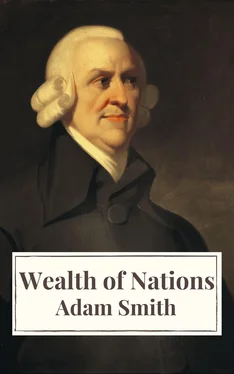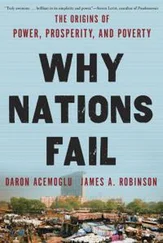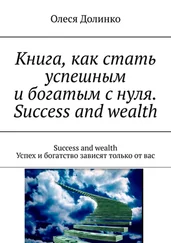Adam Smith - Wealth of Nations
Здесь есть возможность читать онлайн «Adam Smith - Wealth of Nations» — ознакомительный отрывок электронной книги совершенно бесплатно, а после прочтения отрывка купить полную версию. В некоторых случаях можно слушать аудио, скачать через торрент в формате fb2 и присутствует краткое содержание. Жанр: unrecognised, на английском языке. Описание произведения, (предисловие) а так же отзывы посетителей доступны на портале библиотеки ЛибКат.
- Название:Wealth of Nations
- Автор:
- Жанр:
- Год:неизвестен
- ISBN:нет данных
- Рейтинг книги:4 / 5. Голосов: 1
-
Избранное:Добавить в избранное
- Отзывы:
-
Ваша оценка:
- 80
- 1
- 2
- 3
- 4
- 5
Wealth of Nations: краткое содержание, описание и аннотация
Предлагаем к чтению аннотацию, описание, краткое содержание или предисловие (зависит от того, что написал сам автор книги «Wealth of Nations»). Если вы не нашли необходимую информацию о книге — напишите в комментариях, мы постараемся отыскать её.
Adam Smith's masterpiece, first published in 1776, is the foundation of modern economic thought and remains the single most important account of the rise of, and the principles behind, modern capitalism. Written in clear and incisive prose, The Wealth of Nations articulates the concepts indispensable to an understanding of contemporary society.
Wealth of Nations — читать онлайн ознакомительный отрывок
Ниже представлен текст книги, разбитый по страницам. Система сохранения места последней прочитанной страницы, позволяет с удобством читать онлайн бесплатно книгу «Wealth of Nations», без необходимости каждый раз заново искать на чём Вы остановились. Поставьте закладку, и сможете в любой момент перейти на страницу, на которой закончили чтение.
Интервал:
Закладка:
The superiority which the industry of the towns has everywhere in Europe over that of the country is not altogether owing to corporations and corporation laws. It is supported by many other regulations. The high duties upon foreign manufactures and upon all goods imported by alien merchants, all tend to the same purpose. Corporation laws enable the inhabitants of towns to raise their prices, without fearing to be undersold by the free competition of their own countrymen. Those other regulations secure them equally against that of foreigners. The enhancement of price occasioned by both is everywhere finally paid by the landlords, farmers, and labourers of the country, who have seldom opposed the establishment of such monopolies. They have commonly neither inclination nor fitness to enter into combinations; and the clamour and sophistry of merchants and manufacturers easily persuade them that the private interest of a part, and of a subordinate part of the society, is the general interest of the whole.
In Great Britain the superiority of the industry of the towns over that of the country seems to have been greater formerly than in the present times. The wages of country labour approach nearer to those of manufacturing labour, and the profits of stock employed in agriculture to those of trading and manufacturing stock, than they are said to have done in the last century, or in the beginning of the present. This change may be regarded as the necessary, though very late consequence of the extraordinary encouragement given to the industry of the towns. The stock accumulated in them comes in time to be so great that it can no longer be employed with the ancient profit in that species of industry which is peculiar to them. That industry has its limits like every other; and the increase of stock, by increasing the competition, necessarily reduces the profit. The lowering of profit in the town forces out stock to the country, where, by creating a new demand for country labour, it necessarily raises its wages. It then spreads itself, if I may say so, over the face of the land, and by being employed in agriculture is in part restored to the country, at the expense of which, in a great measure, it had originally been accumulated in the town. That everywhere in Europe the greatest improvements of the country have been owing to such overflowings of the stock originally accumulated in the towns, I shall endeavour to show hereafter; and at the same time to demonstrate that, though some countries have by this course attained to a considerable degree of opulence, it is in itself necessarily slow, uncertain, liable to be disturbed and interrupted by innumerable accidents, and in every respect contrary to the order of nature and of reason. The interests, prejudices, laws and customs, which have given occasion to it, I shall endeavour to explain as fully and distinctly as I can in the third and fourth books of this Inquiry.
People of the same trade seldom meet together, even for merriment and diversion, but the conversation ends in a conspiracy against the public, or in some contrivance to raise prices. It is impossible indeed to prevent such meetings, by any law which either could be executed, or would be consistent with liberty and justice. But though the law cannot hinder people of the same trade from sometimes assembling together, it ought to do nothing to facilitate such assemblies, much less to render them necessary.
A regulation which obliges all those of the same trade in a particular town to enter their names and places of abode in a public register, facilitates such assemblies. It connects individuals who might never otherwise be known to one another, and gives every man of the trade a direction where to find every other man of it.
A regulation which enables those of the same trade to tax themselves in order to provide for their poor, their sick, their widows and orphans, by giving them a common interest to manage, renders such assemblies necessary.
An incorporation not only renders them necessary, but makes the act of the majority binding upon the whole. In a free trade an effectual combination cannot be established but by the unanimous consent of every single trader, and it cannot last longer than every single trader continues of the same mind. The majority of a corporation can enact a bye-law with proper penalties, which will limit the competition more effectually and more durably than any voluntary combination whatever.
The pretence that corporations are necessary for the better government of the trade is without any foundation. The real and effectual discipline which is exercised over a workman is not that of his corporation, but that of his customers. It is the fear of losing their employment which restrains his frauds and corrects his negligence. An exclusive corporation necessarily weakens the force of this discipline. A particular set of workmen must then be employed, let them behave well or ill. It is upon this account that in many large incorporated towns no tolerable workmen are to be found, even in some of the most necessary trades. If you would have your work tolerably executed, it must be done in the suburbs, where the workmen, having no exclusive privilege, have nothing but their character to depend upon, and you must then smuggle it into the town as well as you can.
It is in this manner that the policy of Europe, by restraining the competition in some employments to a smaller number than would otherwise be disposed to enter into them, occasions a very important inequality in the whole of the advantages and disadvantages of the different employments of labour and stock.
Secondly, the policy of Europe, by increasing the competition in some employments beyond what it naturally would be, occasions another inequality of an opposite kind in the whole of the advantages and disadvantages of the different employments of labour and stock.
It has been considered as of so much importance that a proper number of young people should be educated for certain professions, that sometimes the public and sometimes the piety of private founders have established many pensions, scholarships, exhibitions, bursaries, etc., for this purpose, which draw many more people into those trades than could otherwise pretend to follow them. In all Christian countries, I believe, the education of the greater part of churchmen is paid for in this manner. Very few of them are educated altogether at their own expense. The long, tedious, and expensive education, therefore, of those who are, will not always procure them a suitable reward, the church being crowded with people who, in order to get employment, are willing to accept of a much smaller recompense than what such an education would otherwise have entitled them to; and in this manner the competition of the poor takes away the reward of the rich. It would be indecent, no doubt, to compare either a curate or a chaplain with a journeyman in any common trade. The pay of a curate or chaplain, however, may very properly be considered as of the same nature with the wages of a journeyman. They are, all three, paid for their work according to the contract which they may happen to make with their respective superiors. Till after the middle of the fourteenth century, five merks, containing about as much silver as ten pounds of our present money, was in England the usual pay of a curate or a stipendiary parish priest, as we find it regulated by the decrees of several different national councils. At the same period fourpence a day, containing the same quantity of silver as a shilling of our present money, was declared to be the pay of a master mason, and threepence a day, equal to ninepence of our present money, that of a journeyman mason. The wages of both these labourers, therefore, supposing them to have been constantly employed, were much superior to those of the curate. The wages of the master mason, supposing him to have been without employment one third of the year, would have fully equalled them. By the 12th of Queen Anne, c. 12, it is declared, "That whereas for want of sufficient maintenance and encouragement to curates, the cures have in several places been meanly supplied, the bishop is, therefore, empowered to appoint by writing under his band and seal a sufficient certain stipend or allowance, not exceeding fifty and not less than twenty pounds a year." Forty pounds a year is reckoned at present very good pay for a curate, and notwithstanding this Act of Parliament there are many curacies under twenty pounds a year. There are journeymen shoemakers in London who earn forty pounds a year, and there is scarce an industrious workman of any kind in that metropolis who does not earn more than twenty. This last sum indeed does not exceed what is frequently earned by common labourers in many country parishes. Whenever the law has attempted to regulate the wages of workmen, it has always been rather to lower them than to raise them. But the law has upon many occasions attempted to raise the wages of curates, and for the dignity of the church, to oblige the rectors of parishes to give them more than the wretched maintenance which they themselves might be willing to accept of. And in both cases the law seems to have been equally ineffectual, and has never either been able to raise the wages of curates, or to sink those of labourers to the degree that was intended; because it has never been able to hinder either the one from being willing to accept of less than the legal allowance, on account of the indigence of their situation and the multitude of their competitors; or the other from receiving more, on account of the contrary competition of those who expected to derive either profit or pleasure from employing them.
Читать дальшеИнтервал:
Закладка:
Похожие книги на «Wealth of Nations»
Представляем Вашему вниманию похожие книги на «Wealth of Nations» списком для выбора. Мы отобрали схожую по названию и смыслу литературу в надежде предоставить читателям больше вариантов отыскать новые, интересные, ещё непрочитанные произведения.
Обсуждение, отзывы о книге «Wealth of Nations» и просто собственные мнения читателей. Оставьте ваши комментарии, напишите, что Вы думаете о произведении, его смысле или главных героях. Укажите что конкретно понравилось, а что нет, и почему Вы так считаете.












